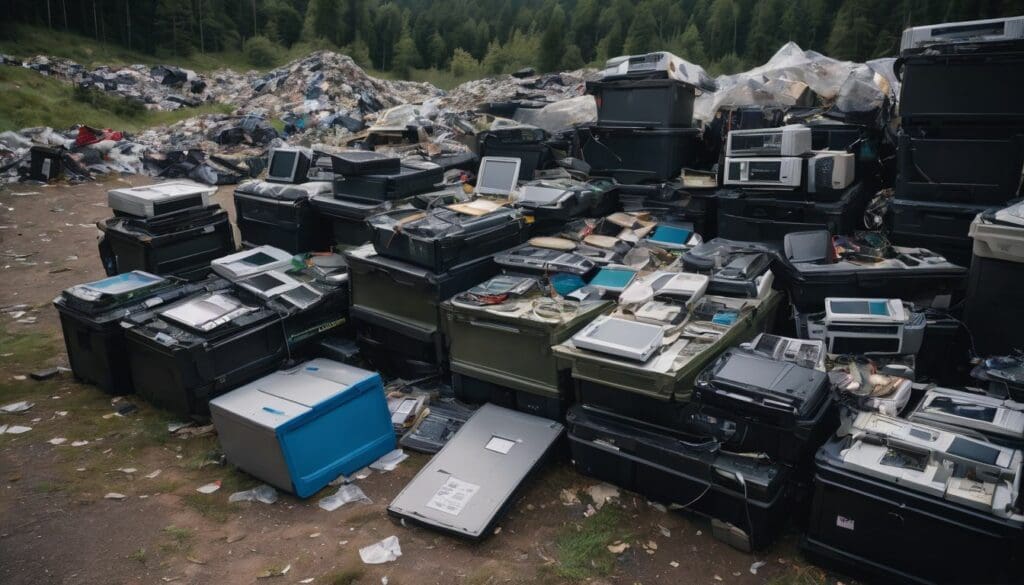Ever pondered the fate of those old gadgets once they’re consigned to the scrap heap? Just like you, we’ve been struck by the sight of electronic waste piling up and felt compelled to seek out a sustainable answer.
Our guide offers a step-by-step approach on how to host an E-Waste Collection Day within our community—it’s straightforward, impactful, and even rather enjoyable! Together, we can make a real change—one disused gadget at a time.
Key Takeaways
- A certified e – waste recycler is vital for responsible disposal and must comply with environmental regulations to minimise the risk of illegal dumping.
- Setting a date for an E – Waste Collection Day should avoid conflicts with major events and holidays to ensure higher community participation, and it’s important to promote the event widely through various channels like social media, local newspapers, and community boards.
- Creating multiple accessible drop – off locations across the community makes it easy for residents to participate in recycling efforts, enhancing convenience and increasing turnout.
- Hosting fun fairs or carnivals can engage people of all ages in e-waste recycling while educating them about its importance through interactive activities such as DIY upcycling workshops.
- Encouraging support for strong e – waste recycling legislation can be achieved by educating neighbours on its benefits, which helps create advocates for sustainable practices within the community.
The Growing Problem of E-Waste
The growing problem of e-waste has significant environmental and health implications. Statistics show that the US produces over 9 million tons of electronic waste each year, with only a small percentage being recycled.
This issue needs immediate attention to prevent further damage to our planet and public health.
Impact on the environment and health
Electronic gadgets pile up in landfills, leaking toxic substances into the soil and water. These harmful chemicals, like lead and mercury, pose a severe risk to wildlife and ecosystems.
When we throw away old phones or laptops, we’re not just discarding electronics; we’re also contributing to air pollution when these items are incinerated. It’s essential that we prevent electronic waste from damaging our planet.
Our health takes a hit too when e-waste isn’t handled properly. Workers at informal recycling sites often lack protective equipment, exposing them to dangerous substances that can cause illness over time.
By organising community e-waste collection days, we shield both nature and people from these risks. Let’s talk about statistics on e-waste in the US next – it will shed more light on why our efforts matter so much.
Statistics on e-waste in the US
We understand the magnitude of the e-waste challenge and its repercussions on our planet. Here’s a snapshot of the current e-waste landscape in the United States.
| Statistic | Details |
|---|---|
| Annual e-waste generation | Approximately 6.9 million metric tonnes (2019) |
| Percentage of e-waste recycled | Only 15% (estimated) |
| Growth rate | E-waste is growing by about 2-3% per year |
| Most discarded items | Phones, computers, and televisions |
| Environmental threat | Toxic substances leaking into soil and water |
| Economic loss | Billions in precious metals discarded annually |
By acknowledging these figures, we realise the importance of immediate action to tackle this growing issue.
Benefits of Organising an E-Waste Collection Day
Organising an E-Waste Collection Day has numerous benefits, including the reduction of e-waste in landfills and the promotion of responsible recycling practices. It also provides an opportunity to raise awareness and educate the community about the impact of e-waste on the environment and public health.
Reduction of e-waste in landfills
Organising a Community E-Waste Collection Day is vital for reducing the amount of electronic waste being dumped in landfills. When we take part in these events, we prevent harmful chemicals from seeping into the soil and polluting our environment.
By partnering with a licensed e-waste collector, we ensure that electronics are responsibly recycled, keeping them out of landfills where they can pose serious health risks.
Hosting an e-waste collection event also raises awareness about proper recycling practices within the community. Encouraging everyone to engage in environmentally sustainable initiatives results in a cleaner and safer living environment for all.
Engaging our local communities in organising these drives will lead to greater participation and understanding of the importance of reducing e-waste in landfills.
Promotion of responsible recycling practices
Promoting responsible recycling practices is vital for preventing e-waste from harming the environment. Encouraging the community to recycle old electronics through certified e-waste recyclers can significantly reduce the negative impact on our landfills and natural surroundings.
By participating in local electronics collection events, we actively contribute to sustainable living and environmental conservation. Engaging the community in responsible recycling not only helps us manage waste more effectively but also fosters a sense of pride in supporting green initiatives and promoting a cleaner, healthier environment for future generations.
It’s important to support licensed e-waste collectors that adhere to proper disposal regulations, as this ensures that our electronic waste is handled safely and responsibly. We should take an active role in educating ourselves about where and how we can dispose of our e-waste properly, seeking out reputable recyclers or hosting public e-waste collection days within our communities.
Potential for raising awareness and educating the community
By promoting responsible recycling practices, we can raise awareness and educate the community about the impact of e-waste on our environment. Hosting educational workshops and informational sessions can help to highlight the importance of proper electronic waste disposal.
Collaborating with local schools, businesses, and media outlets allows us to reach a wider audience and spread knowledge about the benefits of electronics recycling. Engaging in community outreach initiatives helps in building a culture of environmental sustainability, thus encouraging everyone to do their part in reducing e-waste.
Encouraging participation from all sectors – individuals, families, businesses, and local authorities – is key to fostering a sense of shared responsibility for managing electronic waste effectively.
Steps to Organising a Successful E-Waste Collection Day
Finding a certified e-waste recycler is crucial to ensure responsible disposal. Securing logistics for transportation and collection is essential for smooth operations on the day of the event.
Finding a certified e-waste recycler
When organising a community e-waste collection day, it’s crucial to find a certified e-waste recycler who complies with environmental regulations. Research local recycling facilities or search for licensed recyclers in your area.
Engaging with established recycling organisations ensures responsible disposal of electronic waste and minimises the risk of illegal dumping. Verify their certifications and licenses to ensure that they adhere to proper recycling standards.
Securing a partnership with a certified e-waste recycler can also provide valuable expertise in handling different types of electronic waste, ensuring that materials are properly sorted and processed for recycling.
Securing logistics for transportation and collection
After finding a certified e-waste recycler, the next crucial step is securing logistics for transportation and collection. Here’s how to ensure a smooth and successful process:
- Arrange for suitable transportation: Coordinate with local transport companies or waste management services to secure vehicles that can accommodate electronic waste safely and efficiently.
- Determine collection points: Identify convenient locations across the community where residents can drop off their e-waste, ensuring accessibility for all.
- Implement a scheduling system: Establish a clear timeline for the collection day, including specific windows for drop-offs, in order to manage traffic flow and avoid overcrowding at collection points.
- Ensure proper handling and storage: Set up designated areas at the collection points for different types of electronic waste, and provide adequate measures to prevent damage during transportation.
- Communicate with local authorities: Obtain necessary permits or permissions from relevant municipal bodies or regulatory agencies to facilitate the smooth operation of the collection event.
- Recruit volunteers: Engage community members to help with logistics on the day of the event, including directing traffic, assisting with unloading items, and maintaining order at the collection points.
Setting a date and promoting the event
When planning a community e-waste collection day, it is crucial to set a date that allows for ample preparation time and ensures maximum participation. This can be achieved through the following steps:
- Select a date that does not clash with major holidays or conflicting local events to ensure higher turnout.
- Promote the event through various channels such as social media, local newspapers, community noticeboards, and radio stations to reach a wider audience.
- Create eye – catching flyers and posters to display in key locations around town and at local businesses.
- Utilise email newsletters and community group announcements to spread the word and encourage participation.
- Engage with local schools, colleges, and universities to promote the event among students and faculty members.
- Consider partnering with environmentally conscious organisations or groups to extend the reach of promotional efforts.
Ensuring proper safety measures are in place
To ensure the safety of everyone involved in the e-waste collection day, we must:
- Provide protective gear such as gloves and masks for volunteers and staff to protect against potential hazards.
- Secure the collection area to prevent unauthorised access and ensure that only designated personnel handle the electronics.
- Arrange for proper handling and transportation of hazardous materials following regulations and guidelines to avoid any accidents or spills.
- Train all volunteers and staff on safe handling procedures for e – waste to minimise the risk of injury or exposure to harmful substances.
- Have a first aid kit readily available in case of any minor injuries or accidents.
Considerations for rural locations
We must account for the potential challenges of reaching rural areas when planning an e-waste collection day. In these locations, access to proper waste management services might be limited, making it crucial to secure logistics for transportation and collection well in advance.
Additionally, promotion efforts may need to be tailored to the specific needs and interests of rural communities, such as emphasising the impact of responsible recycling practices on local environments.
Safety measures should also be carefully considered given potential distances between rural households and collection points. Engaging local community leaders and organisations can help raise awareness about the event and encourage participation.
Ways to Involve the Community in E-Waste Recycling
Partnering with local businesses and media agencies to spread awareness, hosting a fun fair or carnival to engage the community, creating drop-off locations, encouraging support for recycling legislation and getting neighbours involved.
Partnering with local businesses and media agencies
- Collaborate with local businesses to promote the e – waste collection event through their customer networks and social media channels.
- Seek partnerships with media agencies for advertising support, including radio spots, newspaper adverts, and online promotions.
- Organise joint promotional events or initiatives with local businesses to raise awareness about the e-waste collection day.
- Encourage media agencies to cover the event through news articles or features that highlight the importance of responsible e-waste recycling.
- Explore opportunities for sponsorship or financial support from local businesses to fund logistics and promotional materials for the collection day.
- Leverage the influence of local businesses and media agencies to educate and inspire more community members to participate in electronic waste recycling efforts.
Creating a campaign to spread awareness
Partnering with local businesses and media agencies can significantly amplify the impact of our community e-waste collection day. By harnessing these partnerships, we can create a targeted campaign to spread awareness about the event and the importance of responsible e-waste recycling.
Engaging in strategic collaborations will enable us to leverage resources, reach a wider audience, and foster a stronger sense of community involvement in our recycling efforts.
We envision an engaging outreach initiative that utilises social media platforms, local news outlets, and collaborative marketing materials to educate and motivate individuals to participate in our e-waste collection day.
Our interactive campaign will focus on highlighting the environmental benefits of electronic waste recycling while providing practical information on how residents can get involved.
Hosting a fun fair or carnival to engage the community
Hosting a fun fair or carnival at an e-waste collection event can draw the community together while raising awareness about responsible recycling. Setting up engaging activities like electronic-themed games, DIY upcycling workshops, and eco-friendly craft stalls can attract people of all ages.
This approach creates a lively ambiance that educates and encourages participants to support local e-waste initiatives.
Involving local businesses and media agencies in promoting the event will help spread the word about the e-waste collection day. Additionally, setting up community drop-off locations for old electronics will make it convenient for residents to participate in recycling efforts.
Setting up community drop-off locations
To ensure convenient access for the community, we can set up multiple drop-off locations across the area. Here’s how we can go about it:
- Identify accessible and centrally located venues, such as community centers, schools, or local businesses willing to participate.
- Coordinate with the owners or managers of these locations to secure their agreement and support in hosting drop-off bins or collection points.
- Promote the drop – off locations through various channels, including local newspapers, social media, and community notice boards.
- Provide clear guidelines on acceptable items and any specific instructions for drop-off at each location.
- Ensure that each drop – off point is adequately staffed during specified hours to assist participants and monitor the collection process.
- Regularly monitor the fill levels of collection bins and arrange for timely pickup and replacement as needed.
- Express gratitude to participating venues by acknowledging their contribution and commitment to environmental stewardship.
Encouraging support for recycling legislation and getting neighbours involved
Encouraging support for recycling legislation begins with initiating conversations about the importance of responsible e-waste disposal. Engage neighbours in discussions about how recycled electronics can benefit the community and environment.
By highlighting the positive impact of recycling legislation, we can encourage our neighbours to become advocates for sustainable practices. Additionally, collaborating with local officials or joining advocacy groups can amplify our voices and influence positive changes in e-waste management laws.
Getting neighbours involved in e-waste recycling efforts involves fostering a sense of community responsibility. Organise neighbourhood meetings to educate them on the benefits of proper e-waste disposal and rally their active participation in upcoming collection events.
Conclusion
In conclusion, organising a Community E-Waste Collection Day is an impactful way to address the growing problem of e-waste. Partnering with local businesses and media agencies can help spread awareness and encourage community involvement in electronic waste recycling efforts.
By hosting such events, we take proactive steps towards promoting responsible recycling practices while educating and engaging the public on the importance of e-waste management. This approach not only supports conservation but also ensures that e-waste is recycled responsibly by licensed recyclers, contributing to a healthier environment for all.
FAQs
1. What steps should I take to organise a Community E-Waste Collection Day?
To set up an e-waste collection day, plan your event with a certified e-waste recycler, coordinate the logistics for recycling, and engage the community in participation.
2. How can I involve my local community in an e-waste drive?
Create awareness about electronics disposal through flyers and social media, and encourage community members to bring their electronic waste on the public collection day.
3. Why is it important to work with a licensed ewaste collector for our event?
A licensed e-waste collector ensures that all recycled items are handled responsibly and in compliance with environmental regulations during your ewaste recycling event.
4. Can hosting an ewaste collection help the environment?
Yes! Hosting an ewaste collection helps reduce landfill waste by recycling electronics properly within your city or town’s municipal waste initiatives.
5. What should residents know before attending a community electronic waste collection?
Residents should know what items they can bring for electronics recycling and ensure that these meet the requirements specified by the organisers of the local e-waste drive.





